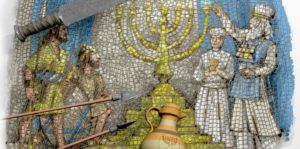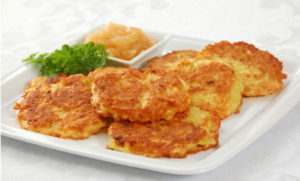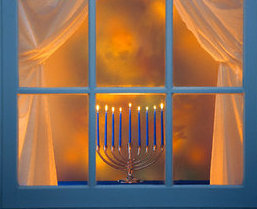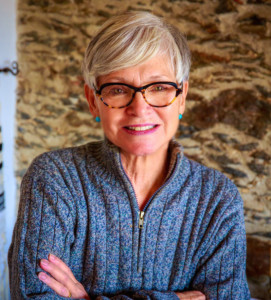“I know what Chanukah is,” said my daughter’s seven year old friend. “It’s Jewish Christmas!” That was almost 30 years ago when my daughter, also seven, knew that Chanukah and Christmas were two different things but nonetheless she enlisted my aid. “Mama, help me explain Chanukah to Angela!” So that’s just what we did.
Because Chanukah often falls close to the Christmas holiday, (some years candles are kindled on Christmas Eve or Christmas day!)), many people believe that Chanukah is a major Jewish holiday. Interestingly, it is not. The holidays that are paramount in the Jewish tradition are Rosh Hashanah, the Jewish New Year, Yom Kippur, the Day of Atonement, and the most important holiday of all, the one that comes every week of the year, the Jewish Sabbath, “Shabbat.” But that doesn’t mean that Chanukah isn’t one of the most well-remembered and one of the most fun.
Its signature ritual item is the Chanukah menorah with its beautiful lights — eight brightly colored candles that symbolize the miracle that is at the heart of the festival. But there is a historical perspective to Chanukah that is important, too.
Chanukah is a December festival that commemorates the military victory of the Jewish people over the Greek-Syrian attempt to force Jews to give up their Jewish practices and adopt a belief in pagan gods. We read in the Apocrypha, in the Book of Maccabees, that Judah Maccabee along with his brothers and other Jewish rebbels, waged a guerrilla war against their oppressors. In an upset victory, this tiny band of poorly equipped soldiers, regained Jerusalem and cleansed the Temple, which the Syrians had defiled.
The story goes that when Judah and his men began their cleanup job they found only one unopened, uncontaminated container of sacred oil — only enough to light the Temple menorah for one day. Optimistically, they lit the menorah, expecting the light to die in a mere twenty-four hours. But legend tells us that a miracle happened. The tiny cup of oil burned brightly for eight days and eight nights, which is why Jews celebrate Chanukah for eight days.
The word, “Chanukah,” derives from the Hebrew. It means “dedication,” as in the dedication of the Temple by the Maccabees, and, interestingly, the same Hebrew root also gives us the word, “chinuch,” which means “education.” Chanukah has come to be a time when we parents educate our children in the traditions of the Jewish heritage and in the indomitable spirit of our ancestors who refused to give up the practice of their Jewish religion. Lighting the “chanukiyah,” (the correct Hebrew name for the “menorah”) makes these traditions come alive.
Chanukah is a happy, joyous holiday that is celebrated in the synagogue and in the home. It is not unusual for each member of the family to have her/his own special menorah. In fact our family uses “chanukiyot” that we’ve made and collected over the years. When the lights are kindled, one candle on the first night, two candles on the second, etc., it should be placed in front of a window or near a door. This allows for the lights to be visible for all to see, reminding us that Chanukah is truly a holiday celebrating religious freedom and that we Jews are free to be who we are. The ninth branch of the menorah is reserved for a special helping candle, the “shammash,” which is used to light all the other candles. Following the candle lighting, special blessings are said, which thank God for keeping us alive and allowing us to reach this season, and which bless God who has performed miracles for us and for our ancestors.
Gift giving is a special part of Chanukah. In my family, eight gifts are given, one on each night. Many families create their own traditions regarding  gift-giving. In ours, we give homemade gifts on the second night. On the fifth night a special gift is given to a charity. Since we Jews are often called “The people of the Book,” in our family, the seventh night is “book night.” where we draw names and give specially selected books to one another. A Chanukah meal includes the traditional “latkes,” potato pancakes fried in oil (reminiscent of the miracle of the oil in the menorah) and “sufganiot,” jelly doughnuts which are a Chanukah favorite in Italy and in Israel.
gift-giving. In ours, we give homemade gifts on the second night. On the fifth night a special gift is given to a charity. Since we Jews are often called “The people of the Book,” in our family, the seventh night is “book night.” where we draw names and give specially selected books to one another. A Chanukah meal includes the traditional “latkes,” potato pancakes fried in oil (reminiscent of the miracle of the oil in the menorah) and “sufganiot,” jelly doughnuts which are a Chanukah favorite in Italy and in Israel.
In her book, Simple Abundance, Sarah Ban Breathnach says that “Many who celebrate Christmas believe that Chanukah is a festival reserved solely for those who practice Judaism.” Ms. Breathnach goes on to point out what Rabbi Harold Kushner has to say about the holiday. Kushner notes that if it weren’t for Chanukah, no one would be celebrating Christmas. If it weren’t for the Maccabees, who bravely rebelled against the Greeks, the entire Jewish faith would have been absorbed into Greek culture. There is a chance it would never have been heard of again.
As Kushner says, in To Life: A Celebration of Jewish Being and Thinking,”There would have been no Jewish community for Jesus to have been born into a century and a half later. Without Chanukah there would have been no Christmas.”
In our synagogue in Calabria, Ner Tamid del Sud, we continue these traditions. Families bring their own Chanukah menorahs and place them on long tables in the sanctuary. Before we light the Shabbat candles, families will join together to light their own menorahs. The candle glow will once again remind us of the joy and privilege of celebrating our Jewish traditions. And, in the Chanukah tradition, we dedicate ourselves anew to the spirit of religious freedom that makes Chanukah an important festival for each and every Jew, the world over.

